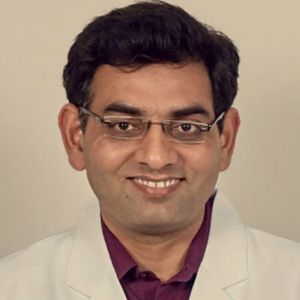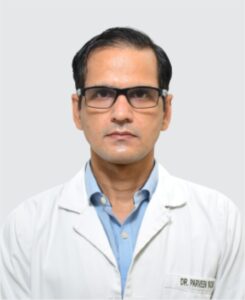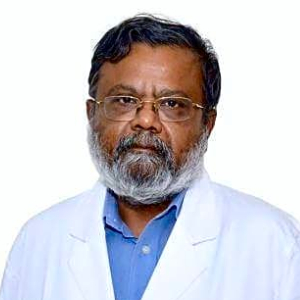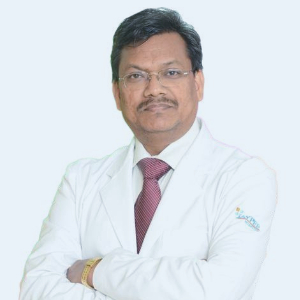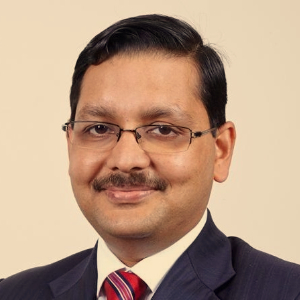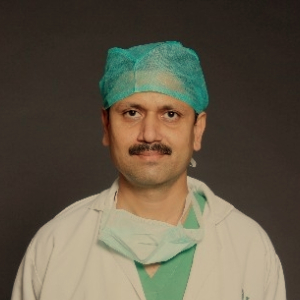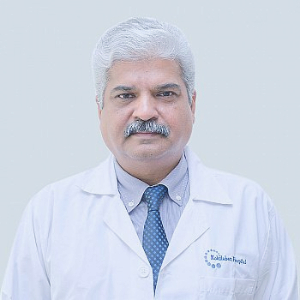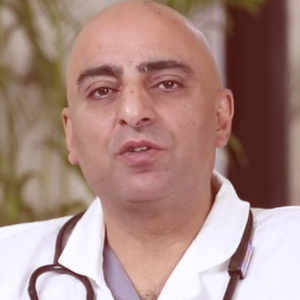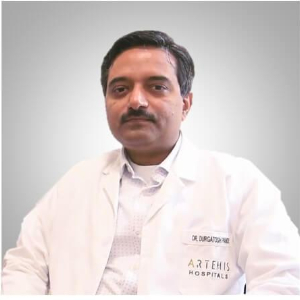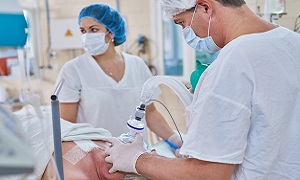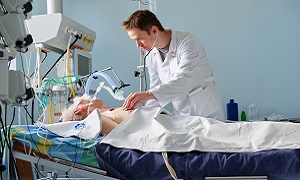Best Doctors in India for Pneumonectomy
- Top Surgical Oncologist | BLK Hospital, New Delhi, India
- 20+ Years Experience
- BLK Super Specialty Hospital, New Delhi
Profile Highlights:
- Dr. Surender Kumar Dabas is a highly esteemed specialist in Surgical Oncology and Robotic Surgery, renowned for his vast experience and expertise. With over 20,000 complex cancer surgeries to his credit, including 2,500 robotic surgeries, he stands as a leader in his field.
- His expertise spans a wide array of specialties including Robotic Scarless Head & Neck Cancer Surgery, Robotic Esophageal & Lung Cancer Surgery, Robotic Pancreatic & Colorectal Surgery, and Robotic Prostate, Bladder & Kidney Cancer Surgery.
- Additionally, Dr. Dabas is a trailblazer in Robotic Surgical Oncology in India, pioneering the Robotic Surgical Oncology Programme and serving as an international mentor for Robotic Onco Surgeries. He has played a pivotal role in teaching and advancing robotic surgical techniques across the country, particularly excelling in Head and Neck Onco Surgeries, with the highest number performed in Asia.
- Thoracic Surgeon & Surgical Oncologist, Gurugram, India
- Over 17 Years Experience
- Artemis Hospital, Gurgaon
Profile Highlights:
- With over 17 years in oncology and 11 years specifically in thoracic surgery, Dr. Parveen Yadav stands as one of the premier thoracic surgeons in Delhi NCR.
- Dr. Yadav boasts extensive proficiency in various domains, including intervention bronchoscopy, soft tissue sarcoma, medical and airway diseases, and minimally invasive esophageal and lung surgeries.
- His repertoire includes over 3000 major thoracic procedures, notably more than 1000 surgeries for esophageal cancer and other esophageal disorders, and an equal number for lung cancer and related conditions, all yielding exemplary outcomes.
- Thoracic Onco Surgeon, New Delhi, India
- Over 30 years’ experience
- Sir Gangaram Hospital New Delhi
Profile Highlights:
- Dr. Sabyasachi Bal specializes in Thoracic Onco surgery and provides treatment for lung cancer, chest cancer, and other types of thoracic malignancies.
- He has over 30 years of experience in the field and has reformed thoracic cancer surgery in India. He has also added Robotic Thoracic Surgery to his list of specializations.
- Dr. Sabyasachi Bal’s primary focus lies in the management and treatment of cancers affecting the thoracic regions and organs near the lungs and chest of both adolescents and adults.
- Top Surgical Oncologist | Max Hospital, Saket, New Delhi, India
- 21+ Years Experience
- Max Super Specialty Hospital, Saket, New Delhi
Profile Highlights:
- Dr. Pawan Gupta is a well-known Surgical Oncologist in India having more than 2 decades and has performed over 7000 onco-surgeries for head and neck, thoracic, breast, GI, and gynecological cancers.
- Before his current role at Max Healthcare, he served as the Additional Director of Surgical Oncology at Jaypee Hospital in Noida (2013-2018).
- Surgical Oncologist, Gurugram, India
- Over 26 years’ experience
- Fortis Memorial Research Institute
Profile Highlights:
- Dr. Vedant Kabra is a reputed Surgical Oncologist with specializations in the surgical treatment of breast, head and neck, thoracic, urological, and GI cancers.
- He has more than 20 years of experience in the field and has performed more than 12,000 cancer surgeries related to breast, GI, head, and neck, and Thoracic and GI cancers.
- Dr. Vedant Kabra received his training in surgical oncology from some of the premier institutes of the world including the National Cancer Center, Singapore, and Tata Memorial Hospital, Mumbai
- He has been a part of several prestigious hospitals in India and has successfully performed several complex cancer procedures including Robotic Surgery for Cancer.
- Top Surgical Oncologist | Apollo Hospital, New Delhi, India
- 20+ Years Experience
- Indraprastha Apollo Hospital, New Delhi
Profile Highlights:
- Dr. S M Shuaib Zaidi is a Senior Consultant of Surgical Oncology at Apollo Cancer Institute of Indraprastha Apollo Hospital.
- His expertise lies in the surgical treatment of cancer of the lungs, esophagus, breast, GI tract, and mediastinal regions.
- Dr. Shuaib Zaidi has close to 2 decades of experience in the field of Surgical Oncology and his expertise lies in Thoracic Oncology surgery.
- Dr. Shuaib is known to have developed an innovative technique known as Radical Neck dissection for head and neck cancer surgery that helps in preserving the marginal mandibular nerve in order to ease the cosmetic outcome of the procedure.
- Dr. Zaidi also has experience in Robotic Surgery and received training in the procedure from IRCAD in Strass Bourg, France.
- Top Surgical Oncologist | Kokilaben Hospital, Mumbai, India
- 35+ Years Experience
- Kokilaben Dhirubhai Ambani Hospital
Profile Highlights:
- With over 35 years of experience, Dr. Rajesh Mistry is one of the best surgeons for Thoracic and Head & Neck Surgeries.
- He is an expert in performing all types of head and neck cancer surgeries including the thoracic region and has performed more than 700 thoracic onco-surgeries, 350 minimally invasive surgeries, 350 open surgeries, 200 Lobectonomies, 250 Esophagectomies, and more than 40 Robotic surgeries for Head and Neck related cancers.
- Top Surgical Oncologist | Apollo Hospital, New Delhi, India
- 26+ Years Experience
- Indraprastha Apollo Hospital, New Delhi
Profile Highlights:
- Dr. Sameer Kaul is a distinguished Surgical Oncologist with more than 26 years of experience, affiliated with Apollo Hospitals Indraprastha in New Delhi.
- His expertise extends to the management of complex cancer cases, including breast cancer, liver cancer, pancreatic cancer, and rectal cancer.
- He is also skilled in performing liver surgeries, providing invaluable care for patients battling liver cancer.
- Surgical Oncologist, Dwarka, New Delhi, India
- Over 20 years’ experience
- Manipal Hospitals, New Delhi
Profile Highlights:
- Dr. Durgatosh Pandey is a renowned Surgical Oncologist.
- He has over 20 years of experience in surgical oncology in top cancer institutes in India.
- He was the Director of Surgical Oncology at Artemis Hospital, Gurugram.
- Currently, he is the Head of Oncology Sciences & Consultant – Surgical Oncology at Manipal Hospitals, Dwarka, New Delhi.
Best Hospitals in India for Pneumonectomy
- City: New Delhi, India
Hospital Highlights:
- Over the last 33 years, the Fortis Escorts Heart Institute has set new standards in cardiac treatment with groundbreaking research. It is now known around the world as a centre of expertise for Cardiac Bypass Surgery, Interventional Cardiology, Non-invasive Cardiology, Paediatric Cardiology, and Paediatric Cardiac Surgery.
- The hospital has cutting-edge laboratories that perform a wide range of diagnostic tests in Nuclear Medicine, Radiology, Biochemistry, Haematology, Transfusion Medicine, and Microbiology.
- Fortis Escorts Heart Institute boasts a diverse group of bright and experienced doctors who are backed up by a team of highly qualified, experienced, and devoted support professionals as well as cutting-edge equipment such as the recently installed Dual CT Scan.
- Approximately 200 cardiac doctors and 1600 personnel currently collaborate to manage over 14,500 admissions and 7,200 emergency situations each year. The hospital now has a 310-bed infrastructure, as well as five cath labs and a slew of other world-class amenities.
- City: Faridabad
Hospital Highlights:
In the sprawling city of Faridabad, where healthcare needs are diverse and ever-evolving, one institution has consistently stood out as a beacon of excellence in the field of medicine—Marengo Asia Hospital. Established with a vision to provide world-class healthcare services to the community it serves, Marengo Asia Hospital has emerged as a trusted name synonymous with quality, compassion, and innovation in healthcare.
- City: New Delhi, India
Hospital Highlights:
- Equipped with 650 beds, BLK-Max Super Speciality Hospital is the largest stand-alone private sector hospital in Delhi.
- With over 1500 healthcare providers and 150 globally renowned super specialists, the hospital is one of Asia’s largest BMT Centres. The hospital is known for having some of the best cancer doctors in the country.
- The hospital is NABH and NABL accredited and was inaugurated by the first Prime Minister of India. Pt. Jawahar Lal Nehru.
- City: Chennai, India
Hospital Highlights:
- Located in Chennai, India, MGM Healthcare is a top multispecialty hospital that provides all medical services under one roof.
- Since its founding in 2019, MGM Healthcare has quickly become a leading national referral centre, creating several innovative flagship initiatives.
- MGM Healthcare combines next-generation medical and digital technologies to provide better patient results.
- With 12 centres of excellence, more than 400 inpatient beds, 100 intensive care unit beds, and 24/7 emergency care, MGM Healthcare leaves no chance in redefining the patient experience in Chennai.
- MGM Healthcare boasts 250+ expert doctors across 30+ departments, including Cardiology, Pulmonology, Neurology, Obstetrics & Gynaecology, and more.
- They house 12 specialized Centres of Excellence, including Neurosciences, Orthopaedics, and Multi-Organ Transplantation.
- Their team of doctors, nurses, and paramedics works together to give every patient individualized treatment.
- City: Noida, India
Hospital Highlights:
- Fortis Hospital, Noida, stands as one of the oldest and most trusted healthcare institutions in the region, setting a benchmark for comprehensive medical care.
- As the second mega hub hospital in the Fortis Healthcare Group, Fortis Hospital, Noida, upholds a legacy of trust among more than 1.2 million patients. By integrating top-tier professionals with cutting-edge technology, the hospital delivers superior treatment across various medical disciplines.
- Specializing in advanced Neurosciences, Orthopedics, Kidney and Liver Transplant Programmes, Fortis Hospital, Noida has successfully performed over 1,500 transplants, solidifying its reputation as a leader in specialized medical interventions.
Pneumonectomy
Pneumonectomy is a type of lung surgery, in which one of your lungs is completely removed. Though this is done mostly due to cancer, it can also be done to treat some other conditions such as tuberculosis, severe chronic obstructive pulmonary disease or any trauma that interrupts major blood vessels near the lungs.
Though pneumonectomy is a major surgical procedure, it is possible to live a full, active life with one lung by making some minor lifestyle adjustments.
Purpose
A Pneumonectomy is generally done as a treatment for non-small cell lung cancer which hasn’t spread outside of your lung tissues.
Your doctor can recommend removing one of your lungs for multiple reasons:
- If the tumors have spread and are also significantly affecting your pulmonary artery or airways
- If the tumors are in the middle of a lung and can’t be reached via a wedge resection or lobectomy.
- The tumor is too large and it is not possible to cut it away from the lung tissue as it is done with other types of lung cancer surgery
This procedure is generally for those, who have adequate lung function in the remaining lung and will be able to survive with only one of the lungs.
Though a Pneumonectomy seems like a radical treatment option if you are having tumors which cannot be completely destroyed through a more conservative procedure, then removing the lung offers the best outcome.
Preparation
Before your procedure, some tests are important, so that the surgery is as successful as possible. You can choose to bring a list of questions with you so that all your concerns are addressed.
Since surgery is generally not the usual treatment for lung cancer which has spread beyond the lungs, your doctor will recommend some tests to rule out the possibility of metastasis, i.e. spread of cancer.
This might include a bone scan for looking for the spread of lung cancer, a brain scan for ruling out brain metastasis and an abdominal scan for ruling out liver metastasis and adrenal metastasis.
Then tests are going to be done, to make sure that you will be able to live with only one lung. Your doctor will recommend you for a pulmonary function test which will evaluate your healthy lung and determine its ability to deliver adequate oxygen to your body alone.
After studying the results of the tests, your doctor will discuss the benefits as well as the risks with you.
You might be recommended to go for pulmonary rehabilitation before the procedure as this is known to reduce the risk of surgical complications by at least half.
Therapies which are included in pulmonary rehabilitation can usually differ depending on your circumstance, though they generally include activities such as breathing exercise, endurance building and more.
You might also need to stop taking certain medications. Talk to your doctor about this, so that he can explain which medications you will need to stop and which you will need to continue. If you are taking any herbal remedies or supplements, let him/her know about this as well.
If you smoke, it is important to stop it before and after your surgery. Smoking can lead to more complications. On the day before the surgery, your doctor will most likely recommend you to fast for some time. This means that you are not supposed to eat or drink anything at least eight hours before the procedure.
Procedure
First, you will need to lie on your side on an operating table, with your arm before your head. You might need antibiotics to help prevent any infection.
You will receive general anesthesia before your surgery starts. It will put you into a deep sleep so that you will not feel any pain during the procedure. The surgery should take multiple hours.
First, your surgeon will be making an incision several inches long between two of your ribs. This cut will go from under your arm to around your back, on the side of the lung being removed.
Then the two ribs will be separated. In some cases, it might be necessary to remove a small part of the rib as well. Then the affected lung will be deflated and removed.
Then your surgeon will close the incision and apply a dressing over it. Most of the time, a chest tube is left in the pleural space from where the lung was removed.
Recovery
After your surgery, you will most likely stay in an intensive care unit where your vital signs will be monitored by the healthcare team. They will be watching your heart rate, breathing rate, blood pressure and also the oxygen levels in your blood. You might also receive oxygen through a nasal tube to ensure that you are getting enough oxygen to your body. Though you might feel sore, there shouldn’t be a lot of pain. You may need breathing therapy, which will help in removing any fluid buildup in the remaining lung. You might also need to wear compression socks. These will help to prevent the formation of blood clots in the legs.
After some days, you will be released and will be able to go home. Although you will be tired and weak for the first few days, slowly you will be able to regain your strength. Don’t worry if it is not happening fast as in time, you will feel strong and energetic once again.
You will probably receive instructions related to:
- Which medication you need to take and how often to take them
- When you should start exercising, what type of exercise you are able to do and how often you should do it
- How you should care for your wounds
- What and how often you should eat
- What type of symptoms you need to look out for and whom to contact if you have questions or problems
During your recovery period, call your healthcare provider if you have any concerns or questions. Let your doctor know immediately if you develop any signs of an infection or any other complications of surgery.
You should inform your doctor if you see any of the following signs:
- Fever of 100.4 or higher
- Swelling or redness near the surgical incision
- Shortness of breath, or pain while breathing
- Increasing pain, especially around the incision site
- Chest pain
- Cough
- Confusion
- Coughing up green, yellow, or bloody phlegm
Risks
Like any surgical procedure, there are risks of a few complications with this procedure. Around 50 percent of people who undergo Pneumonectomy undergo few difficulties which can include:
- Prolonged need for a mechanical respirator
- Cardiac arrhythmia or a heart attack or any other heart problem
- Infection at the incision site
- Pneumonia
- A blood clot in the remaining lung which is known as pulmonary embolism
- Accumulation of pus in the pleural space
- An abnormal connection between the stump of the cut bronchus and the pleural space caused by a leak in the stump
- Any of your organs such as the kidneys failing

